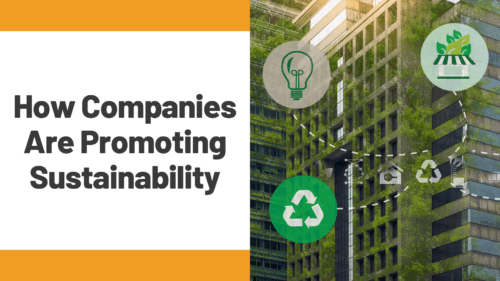
How Companies Are Promoting Sustainability

While companies have been “going green” and promoting sustainability for years, the demand for corporate environmental responsibility is at an all-time high and doesn’t appear to be slowing down. This focus on sustainability has been driven by headlines focused on climate change coupled with changing consumer behaviors from Millennials and Generation Z. Ahead of Earth Day, we took a look at recent announcements from large brands to learn how companies are promoting sustainability and finding innovative ways to do their part.
Was Starbucks Inspired by Their Logo? (Get it? They’re “Going Green”)
Starbucks, jokingly referred to at PTE as “our most valuable team member,” recently announced a “Borrow a Cup” trial program to be launched in five Seattle stores. This effort is just one part of the brand’s larger commitment to reducing waste by 50% by 2030. The “Borrow a Cup” program incentivizes consumers to reduce waste created by disposable cups by having them return borrowed cups to kiosks for professional cleaning and sanitization. According to Starbucks, each borrowed cup could replace 30 disposable cups. Customers will receive $1 back from their initial purchase and ten reward points for returning their “borrowed” cup to a kiosk.
It will be interesting to see how participation in this program tracks amid the COVID-19 pandemic. We anticipate hesitation among the public’s willingness to use previously used cups. Nonetheless, we coffee aficionados are always excited to see what Starbucks is doing and hope the program is successful enough to make its way locally.
Remember when General Motors Electrified the Big Game?
A less recent but very major announcement came from General Motors (GM) back in February during this year’s “Big Game.” The automotive giant directed its attention at Norway, the world leader in electric vehicle adoption, to announce 30 new electric vehicles by 2025. Electric cars certainly aren’t new to the marketplace. Still, they haven’t had the success in the United States that they’ve seen in other countries. GM is looking to change that with 30 new electric models across their automotive brands, including Chevrolet, Buick, GMC, and Cadillac.
While GM’s commercial didn’t make the list of “Our Team’s Favorite Big Game Commercials of 2021”, it certainly made a splash and promised quite a feat for the company to deliver on. Will they be able to change the perception of electric vehicles among consumers in the United States? If anyone can do it, these American-made brands certainly can.
Nike Catches a Lyft Towards a Greener Future
Nike made two big announcements ahead of this Earth Day. The shoe brand introduced Nike Refurbished, a program to refurbish and resell gently used shoes. Nike Refurbished is just one more step in the company’s “Move-to-Zero” initiative, their journey toward zero carbon emissions and zero waste. The program relies on a four-step process where customers return gently worn sneakers to Nike, where they will undergo inspection and grading before they are cleaned and sanitized for resale. Nike Refurbished will also include sales of cosmetically flawed shoes produced at Nike for a reduced price.
Similar to Starbucks’ reusable cups, we anticipate hesitation from some consumers on buying previously worn shoes. Nike Refurbished’s success will rely heavily on how big of a savings customers will see between brand new sneakers and the refurbished or cosmetically flawed counterparts.
Nike also announced a planned partnership with Lyft to provide bike share stations. Details have not yet been shared on where these stations will be located. The popularity of transportation sharing continues to grow, especially in larger cities where it’s more time-efficient and cost-effective to walk, bike, or use public transportation than having a personal vehicle. The eco-friendliness of these models also enhances the public perception of using these services.
Nike’s participation in making bike-sharing stations more accessible is a brilliant move from our perspective. While it’s outside of the company’s vertical business model, the association between the brand and promoting an athletic activity is natural. Nike’s target audience is naturally more active, making them more likely to utilize a bike-sharing service.
Small Businesses (like us) Can Get in on the Action Too
Your business doesn’t have to be a large, multinational corporation to get in on green action. Small companies are promoting sustainability and doing their part to reduce waste as well. For example, we have made minor changes in our office to be more eco-conscious and green: going paperless, opting for traditional coffee makers instead of single-use coffee pods, using reusable water bottles, leaving lights off in empty rooms, and reducing the use of disposable kitchenware. These changes, though small, can make a significant impact and create habits that encourage employees to practice sustainability outside of the workplace.
If your business has gone green, are you telling your audience about it? Take advantage of the opportunity to share your efforts with customers who are likely passionate about the same things you are. Need help getting your message out there? Learn how we can help you spread the word!
You May Like

Networking: For Business and PR
Networking and communication used to take the traditional path of print advertising and brochures, direct mail, local/national trade shows, etc. These forms of communicating your brand/business still exist but more often they are used in balance with modern forms of networking and sharing information about you and your business. Here

The Media Pitch: How To Tell Your Story
Do you have an event or story that you would LOVE the media to pick up, but you're not sure how to get their attention? With so much going on in the news on a day to day basis, it is important that your event or story stands out from

Branding: Consistency is Key
By: Samantha Scott, APR I'll admit it. I'm a bit of a "consistency stickler." It doesn't matter if it's in the tone of writing used on a website or in PMS colors, I can't help but notice when something isn't consistent. In our field, marketing communications, it's important. All too